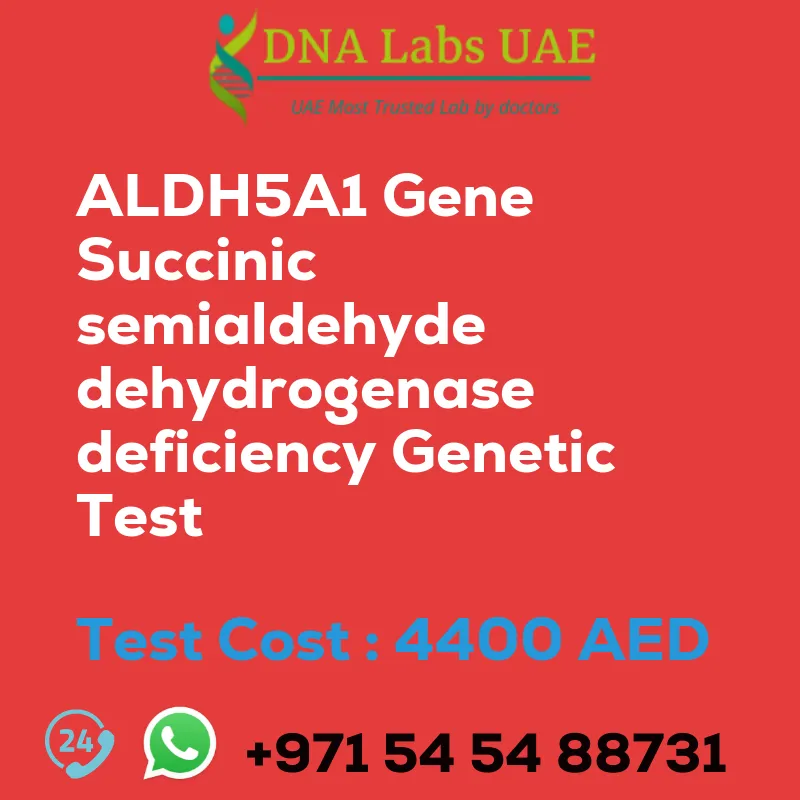ALDH5A1 Gene Succinic Semialdehyde Dehydrogenase Deficiency Genetic Test
Are you or someone you know experiencing symptoms of succinic semialdehyde dehydrogenase deficiency (SSADHD)? DNA Labs UAE offers a comprehensive genetic test to diagnose this rare genetic disorder.
Test Details
The ALDH5A1 gene, also known as succinic semialdehyde dehydrogenase (SSADH) gene, is responsible for encoding the enzyme succinic semialdehyde dehydrogenase. Deficiency in this enzyme leads to SSADHD, an autosomal recessive disorder that affects the metabolism of the neurotransmitter gamma-aminobutyric acid (GABA).
NGS (Next-Generation Sequencing) technology is used in this genetic test to analyze the DNA sequence of the ALDH5A1 gene. This allows for the detection of various types of genetic alterations, such as point mutations, insertions, deletions, or large rearrangements.
Test Components and Price
The cost of the ALDH5A1 Gene Succinic Semialdehyde Dehydrogenase Deficiency Genetic Test is AED 4400.0. The test requires a blood sample for analysis.
Report Delivery
Once the sample is received, the report will be delivered within 3 to 4 weeks.
Test Type and Doctor
This genetic test falls under the category of metabolic disorders. It is recommended to consult with a general physician who specializes in genetics for this test.
Test Department
The ALDH5A1 Gene Succinic Semialdehyde Dehydrogenase Deficiency Genetic Test is conducted in the Genetics department at DNA Labs UAE.
Pre Test Information
Prior to undergoing this genetic test, it is important to provide the clinical history of the patient. Additionally, a genetic counseling session is recommended to draw a pedigree chart of family members affected by SSADHD.
Why is this Test Important?
NGS genetic testing for the ALDH5A1 gene can help in the diagnosis of SSADHD, especially in cases where the clinical presentation is atypical or when other diagnostic methods have not provided conclusive results. It can also be used for carrier testing in individuals with a family history of SSADHD or for prenatal testing in families at risk of having a child with the disorder.
It is crucial to note that genetic testing should be performed and interpreted by healthcare professionals with expertise in genetics and genetic counseling. The results of the genetic test can provide valuable information about the underlying cause of the disorder, guide treatment decisions, and assist in family planning.
| Test Name | ALDH5A1 Gene Succinic semialdehyde dehydrogenase deficiency Genetic Test |
|---|---|
| Components | |
| Price | 4400.0 AED |
| Sample Condition | Blood |
| Report Delivery | 3 to 4 Weeks |
| Method | NGS Technology |
| Test type | Metabolic Disorders |
| Doctor | General Physician |
| Test Department: | Genetics |
| Pre Test Information | Clinical History of Patient who is going for ALDH5A1 Gene Succinic semialdehyde dehydrogenase deficiency NGS Genetic DNA Test A Genetic Counselling session to draw a pedigree chart of family members affected with Succinic semialdehyde dehydrogenase deficiency |
| Test Details |
ALDH5A1 gene, also known as succinic semialdehyde dehydrogenase (SSADH) gene, is responsible for encoding the enzyme succinic semialdehyde dehydrogenase. Deficiency in this enzyme leads to a rare genetic disorder called succinic semialdehyde dehydrogenase deficiency (SSADHD). SSADHD is an autosomal recessive disorder that affects the metabolism of the neurotransmitter gamma-aminobutyric acid (GABA). GABA is an inhibitory neurotransmitter that plays a crucial role in regulating brain activity. In individuals with SSADHD, the lack of functional SSADH enzyme leads to the accumulation of GABA and its metabolite, succinic semialdehyde, in the body. NGS (Next-Generation Sequencing) genetic testing is a method used to analyze the DNA sequence of specific genes, including the ALDH5A1 gene, to identify any mutations or variations that may be associated with SSADHD. This type of testing can provide a comprehensive analysis of the entire gene, allowing for the detection of various types of genetic alterations, such as point mutations, insertions, deletions, or large rearrangements. NGS genetic testing for ALDH5A1 gene can help in the diagnosis of SSADHD, especially in cases where the clinical presentation is not typical or when other diagnostic methods have not been conclusive. It can also be used for carrier testing in individuals with a family history of SSADHD or for prenatal testing in families at risk of having a child with the disorder. It is important to note that genetic testing should be performed and interpreted by healthcare professionals with expertise in genetics and genetic counseling. The results of genetic testing can help in understanding the underlying cause of the disorder, guiding treatment decisions, and providing information for family planning. |








